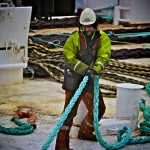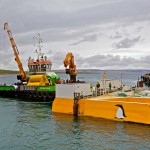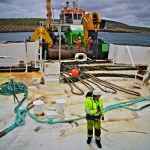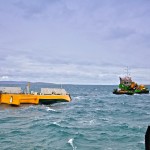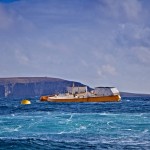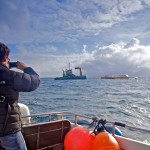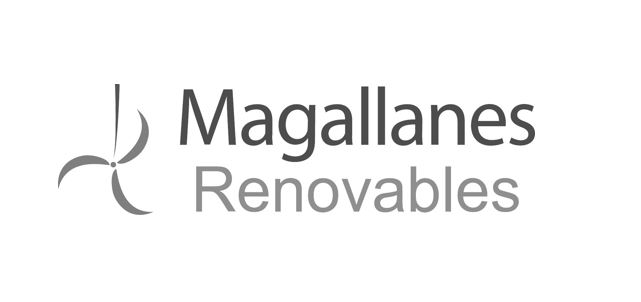CEFOW: Clean Energy from Ocean Waves
The European Commission’s research and innovation programme Horizon 2020 granted €17 million for the Clean Energy from Ocean Waves (CEFOW) research project, coordinated by Fortum.
CEFOW Project
CEFOW aimed to deploy two Penguin wave energy converters (WECs) with improved power generation capability, and demonstrate survivability in challenging sea conditions over a period of several years at EMEC’s grid-connected wave energy test site.
CEFOW objectives
The CEFOW project aimed to demonstrate advanced ocean WEC technology to increase the speed of wave power development and decrease the levelised cost of ocean energy by 30%. This target can be reached by:
- Improving the availability and performance of the Penguin wave device;
- Tailoring the solution with low life-cycle cost in mind for long term deployment; and
- Creating a cost efficient supply chain to support much larger wave energy deployments in the future.
CEFOW Results
The project outcomes and results can be downloaded on the CORDIS website.
CEFOW Periodic Report Summary | Period 1
This report summaries the progress of the project during the first period between 01/06/2015 and 31/03/2017. This included the transportation and deployment of WEC1 at EMEC in Orkney, Scotland.
Measurement Plan | Work Package 7
This plan presents the measurements to be carried out during the testing of the 3 Penguin WECs to verify whether the quality of electrical powered supplied to the national grid complies with EMEC requirements, the efficiency of the WEC(s) with respect to ocean wave power available, as well as to ensure that the WEC(s) can operate safely and sustainably.
Environmental Impacts, Health & Safety | Work Package 6
Work package 6 within the CEFOW project is currently conducting device-specific research to investigate responses of seals, seabirds, fish and seabed organisms to the deployment of single and multiple Penguin wave energy converters at EMEC. The results will aim to aid industry and regulators regarding wider-scale deployments of renewable energy technology and potential environmental responses. As the work package progresses, the Universities of Exeter, Plymouth and Uppsala present on the advancements they are making through CEFOW, these presentations can be viewed below:
The 4th International Marine Protected Areas Congress in Chile, 2017:
Conference on the Environmental Interactions of Marine Renewable Energy Technologies in Orkney, April 2018:
CEFOW News
- 25 March 2019: Wello Penguin issues at Billia Croo
- 7 December 2018: Wello launch Penguin WEC2 for H2020 CEFOW array
- 6 December 2018: SEA Wave to explore environmental impacts of wave energy
- 5 March 2018: The Penguin hits one year continuous deployment milestone
- 14 November 2017: Penguin reaches new heights
- 24 October 2017: H2020 CEFOW Year 1 Ecological Studies Complete
- 7 April 2017: Penguin powers UK grid with wave energy
- 6 March 2017: Green Marine installs Penguin WEC at EMEC
- 3 February 2017: Penguin is getting closer to its first CEFOW deployment
- 27 December 2016: CEFOW-project looking at early 2017 EMEC deployment
Photos
EuroNews
CEFOW Partners
Led by Fortum, CEFOW is supported by a range of project partners with a vast amount of expertise in onshore renewable energy:
- Fortum: Fortum, a multi-national energy utility, believes that a transition to a solar economy, where energy production is based solely on renewable energy sources, is inevitable, although gradual. As an inexhaustible and emissions-free energy form, wave power can play an important role in the future, and that is why it is also a key focus area in Fortum’s research and development work. Fortum is responsible for coordinating the CEFOW project which will take place at the EMEC test facility, where Fortum has signed a leasing agreement for a grid connected wave power array.
- Wello: Finnish wave energy device developer Wello has already developed and successfully tested a single Penguin device at EMEC in Scotland in 2013. The Penguin device is one of the most advanced devices today, when measured in terms of power conversion capability and survivability. Penguin is also the only semi-permanently deployed megawatt scale floating wave energy converter. The CEFOW project will see three Penguin devices deployed at EMEC starting in 2017.
- EMEC: The three Penguin WECs will be deployed at EMEC’s grid-connected wave test site at Billia Croo, off the west coast of Orkney, Scotland. In addition to being the test site of choice for the CEFOW project, EMEC are also leading the dissemination and communications activities for the project.
- Green Marine: Green Marine’s involvement in the CEFOW project is to design a safe & cost effective installation and maintenance plan along with the other partners. Green Marine will be responsible for installing the mooring infrastructure, cabling and installing the Penguin devices onsite along with ongoing maintenance over the full term of the project, using our own vessels and experienced crews.
- Plymouth University: Plymouth University facilitates the sustainable development of wave renewable energy by assessing benthic change, the ecosystem functional relevance and provides advice to developers and regulators for potential mitigation measures. As part of the CEFOW project they will complete the benthic spatial and temporal baseline survey of the EMEC site using towed flying video and produce a research plan. They will annually monitor the impact of the Penguin device(s) and associated management practices and report associated change in seabed biodiversity and integrity.
- University of Exeter: The University of Exeter combines world class research with excellent education at its campuses in Exeter and Cornwall. It is a member of the Russell Group of leading research-intensive universities and are leading on the ‘Environmental Impact and Health & Safety’ work package in CEFOW, and tasked to monitor the effect of the Penguin device(s) on the mobile seabed faunal community and seabird interactions/behaviour.
- Uppsala University: Uppsala University has a vast amount of experience in developing its own linear generator wave energy converter which is also the base for another wave energy technology, Seabased. Uppsala has been running the Lysekil test site for wave energy since 2004 and has contributed greatly in environmental studies related to wave energy. Uppsala university will be involved in work relating to the grid connection, measurements and power quality of the Penguin device. They will also be involved in environmental monitoring by deploying sonars and eco-sounders.
CEFOW Funding
This project has received funding from the European Union’s Horizon 2020 research and innovation programme under grant agreement No 655594.
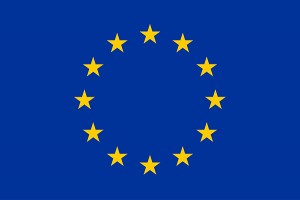
Downloads
Download the latest CEFOW publications:





